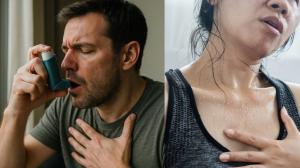Emotional Breathlessness: The Hidden Burden of Chronic Lung Disease
Only 31% of UK adults recognise emotional impacts of COPD, asthma and long COVID, highlighting significant public health issue.
GLOUCESTER, GLOUCESTERSHIRE, UNITED KINGDOM, October 20, 2025 /EINPresswire.com/ -- Millions of people living with chronic lung conditions such as COPD, asthma, and long COVID face more than physical breathlessness — they also experience emotional breathlessness. These invisible struggles — anxiety, fear, depression, and isolation — often remain untreated, quietly eroding quality of life.A new nationwide survey of more than 2,100 UK adults, conducted by YouGov and commissioned by Dr. Devi Sundar founder of Tele-Therapies and MindBody Synergy CIC, based in Gloucestershire, UK, exposes a critical awareness gap. Only 31% of adults in the UK recognise that chronic respiratory diseases can have serious mental health impacts. That means nearly seven in ten people are unaware of the emotional reality faced by millions.
“Our findings show a significant gap in public perception, which can delay help-seeking and under-recognition of psychological distress in people with chronic respiratory illness,” said Dr. Sundar, founder of Tele-Therapies and MindBody Synergy CIC.
A silent crisis
This lack of awareness is particularly pronounced among younger adults (18–24 years, 32%) and men (28%), while women (34%) and older adults (55+, 36%) show slightly higher recognition. Working-age adults stand out with the lowest levels of awareness overall — only 14% say they are “very aware,” while one in four (25%) admit they are “not aware at all.” That has real-world consequences. People of working age are often juggling jobs, families, and health, yet may be least equipped to recognise or seek support for emotional distress linked to chronic illness.
Awareness also differs across life circumstances. Separated or divorced adults (38%) and widowed individuals (33%) are more likely to understand these challenges — possibly because of lived experience or caregiving roles. In contrast, married adults (29%) and parents (33%) show moderate awareness, suggesting more outreach is needed within families and communities.
Regional gaps and their impact
The survey also revealed striking regional variation. Awareness is highest in Wales (37%), the South West (35%) and Northern Ireland (33%), and lowest in the South East (27%) and East of England (29%). Scotland, London, and the Midlands hovered around the national average (31–32%). These differences reflect how local health messaging and community support can shape understanding — or leave gaps.
When emotional breathlessness goes unnoticed, it doesn’t just affect mental health; it worsens physical health too. Anxiety and depression can amplify breathlessness, reduce adherence to treatment and delay help-seeking. In short: emotional suffering can deepen physical suffering.
Integrating mind and lungs.
Over two decades of clinical work, I have seen this disconnect repeatedly. Treating the lungs alone is not enough. At Tele-Therapies and MindBody Synergy CIC, we’ve developed culturally sensitive, trauma-informed programs that combine psychotherapy, neuroscience, Ayurveda, and breath-based rehabilitation. When psychological care is embedded into respiratory treatment, patients cope better, recover more fully, and feel less alone.
This isn’t just a matter of compassion — it’s a matter of health equity and effectiveness. If 69% of people don’t even recognise the mental health impact of chronic lung disease, it becomes much harder to create demand for integrated services. And if emotional support isn’t built into care pathways, the health systems continues to treat symptoms without addressing root causes.
“The mind and lungs are deeply interconnected, communicating through breath and the nervous system. A trauma-informed, culturally sensitive approach can be life-changing. Integration is no longer optional — emotional and physical breathlessness must be treated together.”said Dr. Sundar.
Dr. Devi Sundar’s Call for action
This is why we need to act now:
1. Public awareness campaigns to shine a light on the emotional burden of chronic lung disease.
2. Routine psychological screening and support embedded within pulmonary rehabilitation.
3. Clinician training in trauma-informed and culturally sensitive care.
4. Targeted funding for models that treat both body and mind — not one or the other.
Breath is life. It’s time our health system treated it that way — not just with inhalers and oxygen, but with empathy, awareness, and psychological support.
About Dr. Devi Sundar
Dr. Devi Sundar founded Tele-Therapies LTD and MindBody Synergy CIC
Tele-Therapies offers nationwide, online, evidence-informed programs for people with chronic respiratory disease, anxiety, depression, and burnout. Combining neuroscience, psychotherapy, Ayurveda, and breath-based rehabilitation, it promotes whole-person healing through a culturally attuned, trauma-informed model.
MindBody Synergy CIC, empowers individuals and communities through holistic mind-body interventions, supporting people to overcome chronic respiratory conditions, mental health challenges, and workplace stress-related injuries nationwide. Offers subsidized training to patients and healthcare professionals. Popular activities- Breathe café (free) and Canvas Breath Art (subsidised fee)
Dr. Sundar’s book, Breath Beyond Illness, explores the emotional toll of chronic respiratory disease and the breath–trauma loop linking mind and lungs. It offers evidence-based insights, reflection prompts, and her Psychosocially Integrative Pulmonary Rehab (PIPR) Model for integrating emotional and physical healing.
Breath Beyond Illness is available on Amazon:
Breath Beyond Illness encourages readers to rediscover the healing power of every breath.
• eBook: https://www.amazon.co.uk/dp/B0FV8YG8YM/ref
• Paperback: https://www.amazon.co.uk/dp/B0FVDYCF64/ref
About the Study
The findings are drawn from Tele-Therapies’ service development survey. All figures, unless otherwise stated, are from YouGov Plc. Total sample size: 2,173 UK adults (aged 18+). Fieldwork was conducted online between 7th–8th October 2025. Data were weighted to be nationally representative.
Dr.Devi Sundar
Tele-Therapies
+447471677782 ext.
email us here
Visit us on social media:
LinkedIn
Instagram
YouTube
7 in 10 UK Adults Don’t Know This About Lung Disease
Legal Disclaimer:
EIN Presswire provides this news content "as is" without warranty of any kind. We do not accept any responsibility or liability for the accuracy, content, images, videos, licenses, completeness, legality, or reliability of the information contained in this article. If you have any complaints or copyright issues related to this article, kindly contact the author above.

